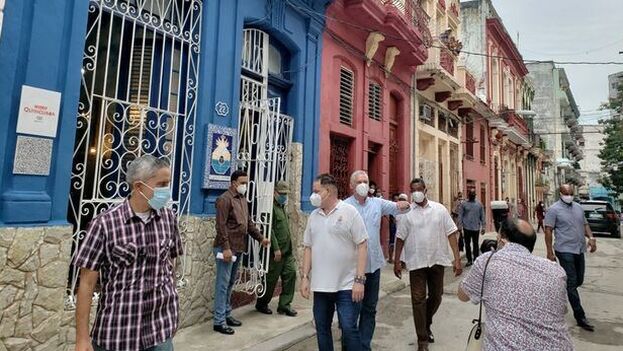
![]() 14ymedio, Juan Izquierdo, Havana, 22 December 2022 — The inclusion of Cuba on the blacklist of countries that violate religious freedom according to the United States has motivated a campaign, by the official press, to prove otherwise. This, despite the fact that several priests, nuns, pastors, Santeria believers and practitioners of different beliefs have been systematically harassed by the Government.
14ymedio, Juan Izquierdo, Havana, 22 December 2022 — The inclusion of Cuba on the blacklist of countries that violate religious freedom according to the United States has motivated a campaign, by the official press, to prove otherwise. This, despite the fact that several priests, nuns, pastors, Santeria believers and practitioners of different beliefs have been systematically harassed by the Government.
Enrique Alemán Gutiérrez, director of the Cabildo Quisicuaba cultural project in Centro Habana, is one of the regular interlocutors of the regime to discuss the issue. Hence, interviewed by the State newspaper Granma on Wednesday, he once again defended that the State “recognizes, respects and guarantees” all religions, although at no time did he admit the political role, as critical voices, that several religious leaders have assumed.
The director of Quisicuaba — a project that also has a social and religious focus — alleges that the Government has registered “innumerable institutions” in the Register of Associations and attributes that “recognition” to the Cuban Revolution.
Alemán says it’s an “accomplishment” that the Communist Party has admitted believers to its ranks since 1991, a membership that was strictly prohibited before the Special Period. In addition, he also mentions a deputy to the People’s Assembly, and that in 1992 the State was defined as secular instead of atheist. The visit of religious leaders such as Patriarch Kirill, the permission to spiritually care for inmates and the granting of religious visas are, in his opinion, signs of the Government’s support for religion.
Therefore, says Alemán, the inclusion of Cuba among the countries disrespectful of religious freedom is a strategy of “imperial politics,” to “divide the people and Balkanize faith.” We must look with distrust, he alleges, at the “religious groups induced from the outside” — sects, Protestant denominations, brotherhoods — that “are neither so religious nor so newly formed.”
For Alemán, these groups are foreign to the “very wide religious range” of Cuba, whose components have already resolved their “common points” and their coexistence within what the founder of Quisicuaba understands as “religious syncretism.” The real problem, he points out, is the blockade, which prevents money and donations from Quisicuaba’s allies and other organizations related to the regime from going to the Island.
During the summer of this year, a report by the Prisoners Defenders organization, based in Madrid, showed how the Cuban government had founded a network of its own religious associations, while infiltrating numerous agents into churches and brotherhoods.
“In the case of Christian Churches, it has created the Council of Churches; in the Yoruba religion, the Yoruba Cultural Association; and in the Islamic religion, it has created the Islamic League of Cuba. The three organizations are controlled by State Security,” the document said. Quisicuaba, a spiritualist sect with social projection, is part of the “strong core” of these organizations, and has received visits from the country’s senior leadership.
At the beginning of December, the U.S. State Department included Cuba and Nicaragua — where the Catholic Church and civil society have been persecuted by Daniel Ortega — on the list of countries of “special concern”, along with China, Saudi Arabia, North Korea, Russia, Iran, Pakistan, Burma, Eritrea, Tajikistan and Turkmenistan; as well as organizations such as the terrorist groups Al Shabab, Boko Haram, the Islamic State, the Taliban, the Houthis of Yemen and the Russian paramilitaries of the Wagner Group.
Translated by Regina Anavy
____________
COLLABORATE WITH OUR WORK: The 14ymedio team is committed to practicing serious journalism that reflects Cuba’s reality in all its depth. Thank you for joining us on this long journey. We invite you to continue supporting us by becoming a member of 14ymedio now. Together we can continue transforming journalism in Cuba.
